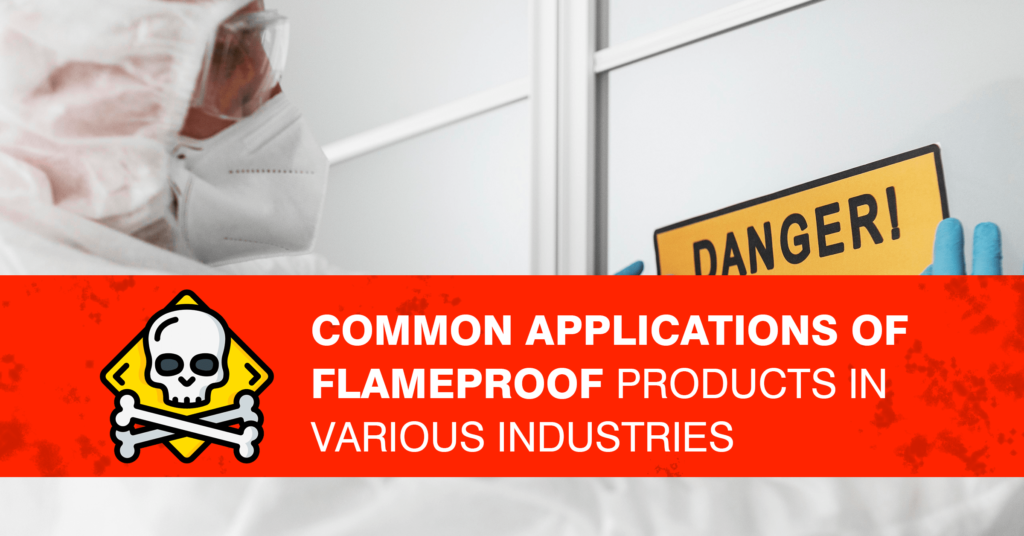In today’s society, industry and technology are everywhere, improving our lives in a variety of ways. However, with all of this advancement comes a major concern: safety. Preventing fires and explosions is a critical part of safety in many businesses.
This is where flameproof materials may help. These specialised devices are used in a variety of sectors to preserve lives and precious assets by preventing fires and explosions.
Flameproof Products - A Brief Overview
Let’s first define flameproof products before exploring their applications. Products that are flameproof or explosion-proof are constructed in a way that stops fires or explosions from spreading inside of them.
They are developed in such a way that it adheres to severe safety requirements. This means that they can withstand internal explosions and prevent external sparks from igniting internal explosions in hazardous conditions.
Discussed below are common applications of flameproof products in various industries:
Oil and Gas Industry
1. Oil Refineries
Flameproof materials are critical in the oil and gas business. Oil refineries contain volatile compounds that, if not managed properly, can cause fires and explosions.
Electrical equipment in these hazardous environments is usually housed in flameproof enclosures, junction boxes, and control panels. These items ensure that any electrical issues or sparks do not result in an explosion.
2. Drilling Rigs
Both onshore and offshore drilling entails a lot of equipment and hazardous ingredients. Electrical equipment and flameproof lighting fixtures are utilised to illuminate work environments safely. They are made to endure the challenging conditions of salt water and the possibility of coming into touch with combustible substances.
Chemical Industry
1. Chemical Processing Plants
Chemical processing plants handle a wide range of chemicals, many of which are highly volatile. Flameproof goods are critical in this situation to avoid catastrophic mishaps. In numerous procedures, flameproof motors, pumps, and switches are employed to guarantee that electrical equipment does not ignite these volatile chemicals.
2. Storage and Handling
Flameproof items are often required in warehouses and chemical storage sites. Flammable chemicals are kept safely in flameproof cabinets and enclosures. They offer a safe atmosphere that wards off flames and explosions, protecting both workers and priceless valuables.
Mining Industry
1. Underground Mining
Mining can be a risky business, especially when it comes to underground mining. There’s a real danger of methane gas explosions. Additionally, flameproof switches and control panels are installed in mining machinery to prevent electrical problems from explosion proof products.
2. Conveyor Systems
Conveyor systems are used to carry big loads and commodities in mining. Flameproof conveyor components, such as motors and sensors, are used to prevent electrical problems from causing fires or explosions, which might be fatal in confined places.
Manufacturing Industry
1. Paint and Coating Facilities
Paint and coating manufacturing facilities frequently operate with extremely combustible ingredients. Flameproof exhaust systems, ventilation, and control panels are employed to lower the possibility of igniting throughout the production process.
2. Metal Processing
Steel mills and foundries, two industries that work with metal, produce a lot of heat and sparks. In order to prevent electrical equipment from becoming a source of ignition, flameproof electrical enclosures and switches are essential.
Pharmaceutical Industry
1. Laboratories
Pharmaceutical research facilities experiment with a wide range of materials, some of which are flammable. Fume hoods, cabinets, and safety equipment that is flameproof ensure that any potential laboratory accidents won’t cause explosions or flames.
2. Manufacturing Pharmaceuticals
To ensure safety requirements when generating pharmaceuticals, pharmaceutical manufacturing facilities utilise flameproof equipment. In procedures requiring solvents and other dangerous compounds, flameproof motors and pumps are widely employed.
Food and Beverage Industry
1. Grain Storage
Grain storage facilities can be at risk of dust explosions. Flameproof electrical components are used to power conveyor belts, fans, and other machinery, reducing the risk of ignition in dusty environments.
2. Distilleries
Distilleries deal with flammable liquids in alcohol production. Flameproof equipments help control systems, and electrical enclosures are used to protect against potential ignition sources during the distillation process.
Aerospace Industry
1. Aircraft Fueling
Aircraft maintenance and fueling operations require extra attention to safety. Flameproof lighting and electrical systems are used in hangars and fueling areas to prevent sparks or electrical issues from igniting aviation fuel.
2. Composite Material Manufacturing
The aerospace industry uses flameproof equipment when manufacturing composite materials. Flameproof ovens and control systems ensure that the process of curing composite materials won’t result in fires or explosions.
Conclusion
In the industrial sector, flameproof items act as unseen protectors of people, property, and the environment. These specialist goods are crucial in avoiding fires and explosions in hazardous situations, whether they are found in oil refineries, chemical processing plants, mining operations, industrial facilities, pharmaceutical labs, food and beverage production, aerospace, or transportation.
The demand for flameproof solutions will only increase as industries and technology develop, underscoring their crucial significance in guaranteeing safety in a variety of areas.
FAQs
Products that are flameproof incorporate ignition sources to prevent explosions in hazardous environments. In order to safeguard employees and infrastructure against the risks of fire and explosion, they are essential in industries like oil, chemicals, and mining.
Examples include electrical enclosures, motors, and lights that are flameproof in the mining, chemical, and oil and gas industries. In order to ensure worker safety and adherence to industry regulations, these devices are designed to operate safely under flammable gas, vapour, or dust situations.







